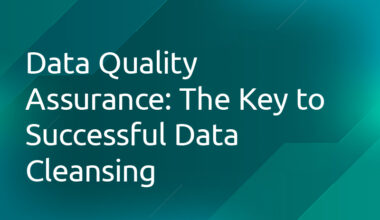In the bustling world of online retail, it’s not just the most innovative products or captivating designs that win the day. Behind the scenes, data drives the core of ecommerce, forming the backbone of everything from product listings to targeted marketing campaigns. But what happens when this data is cluttered, inaccurate, or outdated? That’s where the transformative power of data cleansing comes into play, ensuring ecommerce platforms run efficiently, effectively, and profitably.
What is Data Cleansing?
Data cleansing, also known as data cleaning or scrubbing, is the meticulous process of detecting and correcting (or removing) errors, inconsistencies, and inaccuracies from a data set. In the context of ecommerce, it refers to ensuring that product data, customer information, sales data, and other vital records are accurate, consistent, and up to date.
Why is Data Cleansing So Crucial in Ecommerce?
1. Accuracy Equals Trust: Incorrect product details, pricing mismatches, or outdated inventory counts can undermine customer trust. Data cleansing ensures that customers get what they expect, every time they make a purchase.
2. Improved Decision Making: For ecommerce businesses, making informed decisions about stocking, marketing, and sales strategies requires accurate data. Clean data lays down a strong foundation for analytics, forecasting, and business intelligence.
3. Efficiency and Productivity: Clean data means streamlined operations. Automated systems work better, and employees don’t waste time sifting through or rectifying inconsistent data.
4. Targeted Marketing: To reach the right customer with the right message, you need accurate customer data. Data cleansing ensures your marketing campaigns hit the mark more often, maximizing ROI.
Data Cleansing in Action: How It Transforms Ecommerce
– Personalized Customer Experiences: By cleansing customer data, ecommerce platforms can offer more personalized shopping experiences, recommend products more accurately, and enhance overall customer engagement.
– Inventory Management: With cleaned product and sales data, businesses can better manage their inventory, avoiding overstocks or stockouts, and optimizing warehousing costs.
– Optimized Pricing Strategies: Accurate competitor and market data, once cleansed, allow ecommerce platforms to implement dynamic pricing strategies, ensuring they remain competitive and maximize profits.
– Enhanced SEO and Search Accuracy: Clean product descriptions and meta data improve search engine rankings and ensure customers find exactly what they’re looking for on your platform.
Best Practices for Ecommerce Data Cleansing
1. Regular Audits: Schedule routine data audits to identify errors or inconsistencies.
2. Use Advanced Tools: Many advanced data cleansing tools can automate much of the process, ensuring consistency and saving time.
3. Establish Data Quality Standards: Before data enters your system, set standards for its quality. This proactive approach minimizes the need for reactive cleansing.
4. Training and Awareness: Ensure that team members understand the importance of data quality and know how to spot and rectify errors.
In the ecommerce realm, where competition is fierce and customer loyalty is hard-won, the importance of accurate, reliable data can’t be understated. Through effective data cleansing, ecommerce platforms can transform their operations, leading to increased customer satisfaction, improved decision-making, and ultimately, heightened success. Embracing the transformative power of data cleansing isn’t just good practice—it’s essential for any ecommerce business looking to thrive in today’s digital marketplace.
 1.416.619.5349 Ext.325
1.416.619.5349 Ext.325 







